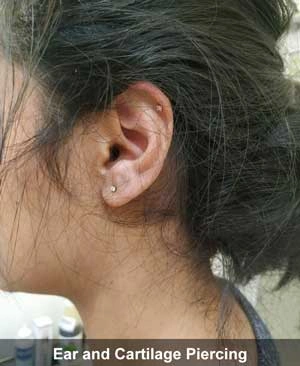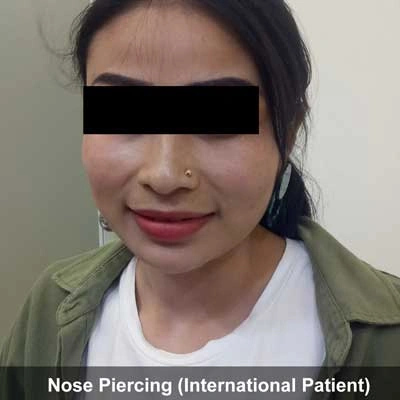Painless Ear & Body Piercing Centre in Gurgaon, Delhi NCR, India
The trend keeps changing and what was just a ritual has become the fashion of today. People used to get their ears pierced as part of their culture, but now both women and men are opting for ear and body piercings. Before following the trend blindly,

you should know some key facts about ear & body piercing.
Facts About Piercing
- Can become a barrier in some career paths such as defence services or aviation.
- Ensure you are vaccinated for hepatitis B and tetanus to avoid any risk.
Risk Involved
Piercing is generally safe if done in hygienic conditions with sterilized equipment. However, if not done properly, the following risks may occur:
- Chances of blood-transmitted diseases such as Hepatitis B & C, Tetanus, and HIV.
- Skin allergy or chronic infection at the piercing site.
- Pain and pus (abscess) formation.
- Nerve damage.
- Prolonged bleeding.
Additionally, people with diabetes, heart problems, or those who are pregnant or taking steroids should consult a doctor before getting pierced.
Where to Get Pierced?
Piercing may seem simple but carries potential risks. Always ensure you go to a certified place. Keep in mind:
- Research safe and professional piercing studios near you.
- Consider doctors who perform ear & body piercings.
- Avoid kiosks or jewelry shops in malls where sterility cannot be guaranteed. For ear piercings, choose professionals.
- Ensure the clinic uses an autoclave for sterilization.
Piercing can be done using needles or guns. Needles are cleaner and can be sterilized easily. If a piercing gun is used, ensure it’s for single use only. For cartilage or body piercings, needles are preferable.
The Healing Process
Healing time varies depending on the body part:
- Earlobe: Heals within 10 days to 4 weeks.
- Ear cartilage: Takes up to 4 months to heal and a year to feel normal.
- Eyebrows: Heals in about 6–8 weeks.
- Nose: Nostril piercings heal in 2–4 months; septum piercings in 6–8 months.
- Lips: Heals in 2–3 months.
- Navel: Takes 5 months to 1 year to heal completely.
Precautions for Newly Pierced Ear
Proper aftercare ensures a smooth healing process. Follow these tips:
- Always wash hands before touching the piercing.
- Clean with antibacterial cleanser and soak in warm saline water to remove crusts.
- Use alcohol-free mouthwash for lip or tongue piercings.
- Avoid excessive touching to prevent irritation.
- Apply antibiotic ointment for a few days.
- Avoid makeup near the piercing and tight clothing on body piercings.
- Do not remove jewelry prematurely; it can close or trap infection.
- Ensure you are not allergic to the jewelry metal.
How You’ll Know Something Went Wrong?
Temporary pain or swelling is normal, but infection signs include:
- Prolonged pain or swelling
- Persistent redness or itching
- Yellow discharge (pus) with foul odor
Keep your piercings clean and seek professional help if any issue persists. Always visit a trained expert for safe and hygienic results.


